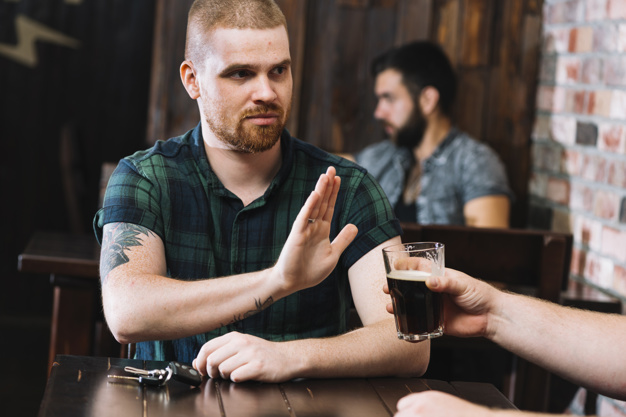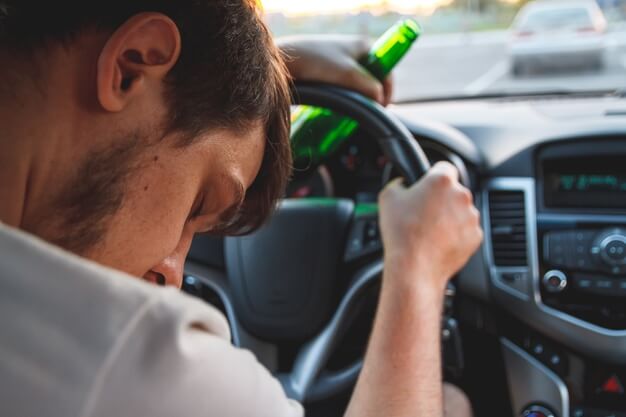Tag: Drinking

Good Reasons to Stop Drinking in your 40’s
There is no better time to quit alcohol than when you hit midlife. When you reach your 40’s, there is a feeling of urgency to evaluate how well you have been doing with the different aspects of your life. Your body is also sending signals that you can’t ignore. You could have arrived at this decision to quit drinking due to health reasons. You may have decided to stop because it is affecting your mental health and family life. Here are some specific explanations to encourage you to live sober. 1. No more morning breath Admit it, you’ve done it more times than you think. You get hammered, you fall asleep on the couch, and you wake up with bad breath. You forgot to brush your teeth last night! You forgot to take a shower, and now you absolutely stink. This is worse if you wake up with someone wonderful beside you. Alcohol makes your breath foul because it encourages the growth of harmful bacteria in the mouth and gums. The smell gets worse when the bacteria come into contact with certain foods such as cheese, onions, and garlic. 2. You won’t miss the hangovers This is self-explanatory. 3. Your memory will improve, and so will your concentration One of the biggest reasons people drink alcohol is because they loosen up after a tipple. Alcohol is a sedative, and indeed, it does momentarily make you feel less anxious. Once you’ve decided to quit, one of the things you will miss the most would be a scene like this: You get home, put down your things, open the fridge, and get a drink. You will have to re-learn how to relax if you skip the alcohol. When you depend on alcohol to relax, the brain’s neurochemistry changes in such a way that you become forgetful. However, after you quit and go through the initial stages of withdrawal, your brain will be able to adapt. Some people remark that when they stop drinking, a haze lifts. Suddenly, there is no mental fog. 4. You sleep better A lot of people depend on alcohol to lull themselves to sleep. Because alcohol has a sedative effect, we mistakenly think that it is a sleep aid. Wrong! Alcohol may help you fall asleep, but it will disrupt your sleep. According to health experts, when you drink alcohol before sleeping some of these things might happen: You wake up several times in the middle of the night You don’t feel refreshed—you don’t have “deep sleep”, instead it is as if you are awake while trying to sleep (“shallow sleep”) You wake up too early and can’t fall back to sleep Unfortunately, when you quit drinking, your insomnia may get a bit worse until your body adapts. Walking around in the middle of the night is a common complaint among people who are in withdrawal. But trust the system—you may begin to see improvements in as few as three days (or nights). 5. Weight loss Why do you lose weight when you quit? Because when you quit alcohol, you also quit the snacks and nibbles that go with the drinks. Alcohol messes up the metabolism of food in your body. When there is alcohol present, the body prioritizes its digestion before any other substance. This leads to a slower burn of fats and an accumulation of fats that weren’t burned in your buttocks (or gut). 6. You avoid cancer When you are in midlife, you worry about diseases such as cancer. We are not young and spry anymore, some of our bad habits seem to be catching up with us. We may even have friends who are in cancer treatment. Consider this: In a new study published recently in the American Journal of Public Health, people who drink more than three servings of alcoholic beverages have a higher chance of getting cancer. Particularly, they were affected by breast cancer, skin cancer, and ovarian cancer. Be forewarned. 7. Alcohol is not (really) good for the heart The American Heart Association does not recommend people to start drinking because “it is good for the heart.” Early studies have linked the consumption of wine to good cholesterol levels, but these studies are not definitive. If you are using “good heart health” as an excuse not to get sober, it’s now time to drop it. 8. Better skin Dermatologists warn that alcohol’s dehydrating effects are to blame for acne and increased wrinkle production. Quitting gives your skin a chance to rehydrate. As moisture is the best friend of glowing skin, drink lots of water when you start abstaining so that your skin will heal better. Expect to see results in about a month. 9. Avoiding liver disease If you began drinking in your teens and you are still drinking now, you are at risk of liver disease. The facts are scary. According to the American Accreditation HealthCare Commission, men aged between 40 to 50 who identify themselves as “regular drinkers” are most at risk. 10. A mid-life reevaluation We are all familiar with the term “midlife crisis”. Perhaps it is better to look at it as a sort of life evaluation. If you start to depend less on alcohol and more on your inner strength to go about life’s challenges, some surprising truths may emerge. Your goal at this stage of life is to answer the questions, “How am I doing so far in this lifetime?” “Are there things I want to change?” Forty (and above) seems to be a good time to start having more satisfying relationships and meaning in life. When you quit alcohol, sometimes you face the truth that you have been using it to dull your pains and disappointments, particularly with certain loved ones. Sober living sometimes leads us to make dramatic changes in our relationships—in the long run, it is good for our emotional and mental health. It is crucial to follow through the intention to live sober. Having the right support is vital if you are going to change the way you live for good. Being sober will affect how you connect with friends and family members. It will also mean you need to change the assumptions you have about yourself. You are never too old to learn new things, they say. Now go ahead and prove it. Read Also: 10 Reasons To Stop Drinking Alcohol Today 3 Alcohol Prevention Tips To Kick Your Old Drinking Habits To The Curb How To Quit Alcohol: Consider Non-Alcoholic Drinks
READ MOREDetails
The Effects Of Drinking And Driving Under The Legal Age Of 21
Consequences Of A DUI: Drunk driving is still a widespread problem in the United States, especially among young people. Individuals 21-34 years old are currently responsible for more drunk driving fatal accidents compared to all other age groups. These young adults are involved in more drunk driving fatal accidents compared to all other demographics, where 8 out of every 100,000 individual deaths are caused by a drunk driver. There are numerous organizations these days that are trying to bring awareness to this problem, like Fathers Against Drunk Driving (FADD) and Mothers Against Drunk Driving (MADD). Despite the serious consequences of drinking and driving under 21 years old, many young Americans continue putting others and themselves at risk when they drive after drinking. Those frightening statistics remind us to exercise extreme caution at all times while out on the road and to be on the lookout for signs of intoxicated drivers. If you notice a driver driving at unsafe speeds, making any erratic movements, or swerving, then you should keep your distance, and as soon as you can call 911. You could save someone's life by doing so! What is DUI? A DUI is Driving Under the Influence. It has been shown in studies that a majority of individuals will drive 87 times while drunk before they are first arrested for a DUI. The penalty laws do vary from one state to the next, however, when a driver has a higher than 0.08 Blood Alcohol Content, they are considered to be over the legal limit for alcohol. A zero-tolerance policy is in place for minors, which means a DUI will be charged with a BAC over 0.01. In such situations chances of getting arrested become high. Furthermore, to prevent the bail bonds in Pasadena tx serves the best way to get out of jail A majority of DUI arrests show drivers having an average 0.16 BAC. In the state of California, the following can result from a first-time offense: More expensive auto insurance premiums DUI school Probation of 3 to 5 years Suspended License for a maximum of 6 months Fines up to $1,300 A second-time offender may receive a 2-year suspension of their driver's license. Individuals with 2 DUI offense or more will be frequently mandated by the court to AA meetings, alcohol, and drug treatment, or a jail sentence. However, 50-75 percent of individuals with a DUI continue driving even though their license has been suspended. Dangers Caused By Drunk Driving in the U.S. According to Gwinnett county dui laws, anyone caught while driving under the influence of alcohol or any other intoxicant can face serious charges. This can amount to jail time in a juvenile prison or an adult jail if you are above 18 years of age. It also means that you will have to carry a DUI record on your name for the rest of your life. This can severely restrict your chances in areas like college admissions and job applications. Working with a good and experienced DUI attorney is the best possible option for teenagers and young adults that are caught in such charges. Approximately 16,000 individuals die every year in the U.S. in an accident related to drunk driving. One out of 3 Americans are involved at some point in their lives with an alcohol-related crash. Alcohol impairs brain function and many people don't realize that they are too drunk to be able to drive before they get behind the wheel. While they are drunk, delayed response time is experienced by a drunk driver and they are not as likely to obey traffic signals. Just one drink can potentially impair driving skills. Over the Thanksgiving holiday is when the drunkest driving fatalities take place. How is your ability to drive affected by alcohol? Alcohol is a kind of depressant drug. When it is consumed it slows down the central nervous system of a person and reduces mental inhibitions as well, which affects the person's situational awareness and brain function. The impairment can cause the individual to take risks that are unnecessary when driving out on the road and increase the risk of being involved in an accident substantially. Alcohol has the following effects that impair the ability of a person to drive: Difficulty multitasking Overconfidence Reduced sensory perception Drowsiness Reduced reaction times Impaired vision Many teenagers have a tendency to binge drink alcohol and then drive while drunk. Frequently teenagers give in to peer pressure or are unable to control how much they drink. Alcohol can cause teens to feel overconfident, just like adults, and they will end up driving when they are told they have drunk too much. The leading cause of death among teenagers is car crashes and one out of three of these crashes have alcohol involved. Over 3,000 teenagers die from an alcohol-related auto accident every year. Organizations such as FADD and MADD are working hard to help bring more public awareness to the consequences caused by drunk driving. Read Also: There Is A Pothole Problem In America – How To Protect Your Car From Damage? How Do Self-Driving Cars Really Compare To Human Drivers In Terms Of Safety 5 Benefits Of Car Title Loans And One Important Warning
READ MOREDetails















